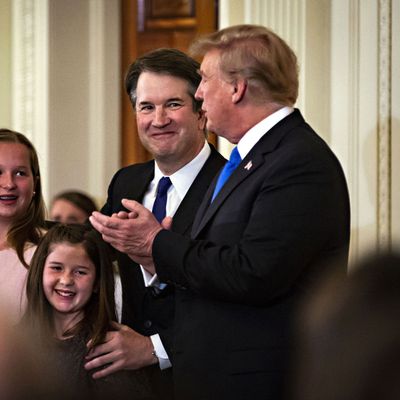
One of the reasons D.C. Circuit Court Judge Brett Kavanaugh was chosen for Donald Trump’s crucial second Supreme Court nomination is that he’s been around Washington long enough there shouldn’t be any big surprises in his confirmation process. If he has any politically debilitating vices or secretly worships Satan, it would have surely come out when he was Kenneth Starr’s top assistant or when he was a high-ranking official in the Bush White House or during the lengthy process that eventually led to his confirmation for the D.C. Circuit. His long record of decisions has, we should assume, been fully vetted both by his Federalist Society sponsors and by Democratic-affiliated judicial groups. That’s not to say his confirmation hearings or an eventual Senate debate won’t have their moments of drama. It’s just that they will mostly be predictable.
And in the end, the most predictable outcome is that all 50 Senate Republicans (with John McCain absent) will vote to confirm Kavanaugh, and once his confirmation is secured, several vulnerable red-state Democrats are likely to seek permission from their party and liberal advocacy groups to go along to protect themselves. That’s how the deal went down last year over Neil Gorsuch’s nomination, and there’s no particular reason to think it will go any differently this time around.
The wild card, if there is one, is that this will be the most intense judicial confirmation fight since the all-consuming battle over Clarence Thomas in 1991. On both sides, senators will face threats of political annihilation and promises of eternal loyalty for their votes. But the constitutional questions that Kavanaugh would help resolve on the Court are so well-rehearsed that there will be a ritualistic quality to the debate that lends itself to a simple partisan outcome. You have to figure that a smart conservative like Kavanaugh mastered the art of Janus-like deception on hot-button items like abortion back in law school, and could mumble dishonest assurances in his sleep by now to both sides that he would never prejudge something like a challenge to Roe v. Wade. So the hardest thing for senators to justify will be any departure from the template set out during the Gorsuch confirmation.
At this point there are three Republican senators who need some serious attention from Kavanaugh’s managers (led by former senator John Kyl), from the White House, and from the conservative activists who have prayed for this day to arrive for many years. They are the two last remaining pro-choice Republican lawmakers in Congress, Susan Collins of Maine and Lisa Murkowski of Alaska, and the ever-eccentric Rand Paul of Aynrandistan by way of Kentucky.
If the Gorsuch confirmation is any indication, Collins will expect and then rely on any false assurances Kavanaugh can provide that he cherishes the judicial principle of stare decisis (deference to Supreme Court precedents) above all else, and thus would theoretically be open to letting Roe stand, at least until even more conservatives join the Court. Assuming Collins (a relatively youthful 65) is interested in another Senate term in 2020, you can assume the conservatives who have recently dominated her party in Maine will make it plain to her that she will face a vicious primary fight if she votes against Kavanaugh. Murkowski’s history suggests she will likely shake down the Senate and the White House for present and future public policy treats for her semi-colonial state–and then vote with her party. She, will face voters in 2022.
Paul’s apparent policy issues with Kavanaugh are far less fundamental than the constitutional right to an abortion, and can probably be assuaged by some face time from the putative Justice and a few phone calls from Trump. He’s allegedly still sore over abuses of executive powers by the Bush White House, where Kavanaugh was an important part of the legal help. Paul’s pattern has been to make some ideologically driven noise and then put on the party harness when the votes are counted.
Before progressives begin camping out at the offices of red-state senators who are on the fence about Kavanaugh, they should internalize the fact that if Republicans do fall into line, then it just doesn’t matter (except perhaps for setting a precedent if Trump gets even more SCOTUS openings to fill) how Heidi Heitkamp or Joe Donnelly or Joe Manchin (to name the three vulnerable senators who supported Gorsuch) vote on the confirmation. As a party Democrats will have to weigh the impact of the Kavanaugh confirmation on their prospects of hanging onto Senate seats that the Donkey Party is not likely to get back in the foreseeable future if they lose them this year. And progressive advocacy groups should probably focus on Collins and Murkowski first, offering them (if they can) a safe electoral future occupying the sensible center of the road in their states.
Since none of the senators who are persuadable on Kavanaugh are members of the Judiciary Committee, the actual fight over his nomination will likely play out in the background of the official confirmation hearings, which are being scripted even now. Watch for signs of wavering from Maine, or of excessively greedy demands from Alaska, or of a bigger-than-usual Stand by Rand. If those signs of trouble transpire, things could get interesting.






























